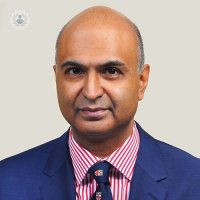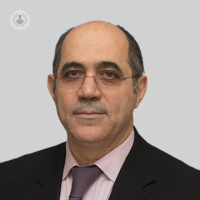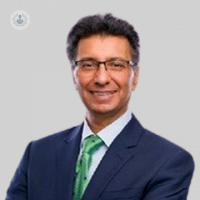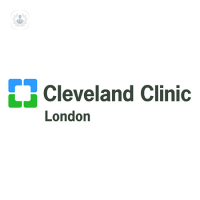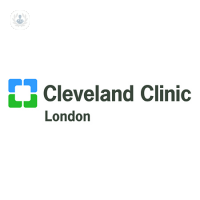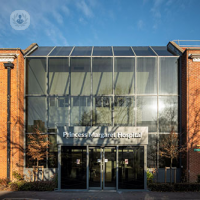What is a transoesophageal echocardiogram?
A transoesophageal echocardiogram (TOE) is an ultrasound test that is used to look at the heart and its nearby blood vessels without other organs blocking the view. A special flexible tube is inserted into your mouth and passed down the throat into the gullet to check how well the structure of your heart is functioning.
The probe used in TOE is the same width as an index finger and it produces a clearer and more accurate echo picture than those taken from the front of the chest. It also appears in real-time. You will still be able to breathe normally during the test, and it should not be a painful experience.

What happens during TOE?
During the procedure, which takes about 30 minutes, you will lie down on a bed on your left side with your head tilted slightly forward. The specialist, usually a cardiologist, will spray the back of your throat using a local anaesthetic and place a plastic guard over your teeth to protect the scope and your teeth, before putting the probe into your mouth.
The probe will send out soundwaves and pick up the returning echoes, which are then converted into images of the inside of your heart, which are displayed on a screen.
What are the possible reasons to have TOE?
You may need a TOE to check any of the following:
- Your heart valves or muscle
- For infection in your heart valves
- If you have any blood clots
- For tears in the aorta
- To see if there are any heart defects, such as a hole in the heart
Are there any possible complications to having a TOE?
Possible complications following the procedure may include:
- An allergic reaction to the sedative
- Inhaling the contents of your stomach, which can be avoided if you don't eat before the procedure
- A very small risk of a tear to the oesophagus
Will I need any more heart tests afterwards?
Following a TOE, you may have to have other tests such as an electrocardiogram (ECG), blood tests and CT scan or MRI scan. A TOE, however, may be enough to rule out a problem with your heart or it will show that you need more of these tests.
05-11-2020 08-25-2023Transoesophageal echocardiogram
Dr Rajesh Chelliah - Cardiology
Created on: 05-11-2020
Updated on: 08-25-2023
Edited by: Carlota Pano
What is a transoesophageal echocardiogram?
A transoesophageal echocardiogram (TOE) is an ultrasound test that is used to look at the heart and its nearby blood vessels without other organs blocking the view. A special flexible tube is inserted into your mouth and passed down the throat into the gullet to check how well the structure of your heart is functioning.
The probe used in TOE is the same width as an index finger and it produces a clearer and more accurate echo picture than those taken from the front of the chest. It also appears in real-time. You will still be able to breathe normally during the test, and it should not be a painful experience.

What happens during TOE?
During the procedure, which takes about 30 minutes, you will lie down on a bed on your left side with your head tilted slightly forward. The specialist, usually a cardiologist, will spray the back of your throat using a local anaesthetic and place a plastic guard over your teeth to protect the scope and your teeth, before putting the probe into your mouth.
The probe will send out soundwaves and pick up the returning echoes, which are then converted into images of the inside of your heart, which are displayed on a screen.
What are the possible reasons to have TOE?
You may need a TOE to check any of the following:
- Your heart valves or muscle
- For infection in your heart valves
- If you have any blood clots
- For tears in the aorta
- To see if there are any heart defects, such as a hole in the heart
Are there any possible complications to having a TOE?
Possible complications following the procedure may include:
- An allergic reaction to the sedative
- Inhaling the contents of your stomach, which can be avoided if you don't eat before the procedure
- A very small risk of a tear to the oesophagus
Will I need any more heart tests afterwards?
Following a TOE, you may have to have other tests such as an electrocardiogram (ECG), blood tests and CT scan or MRI scan. A TOE, however, may be enough to rule out a problem with your heart or it will show that you need more of these tests.
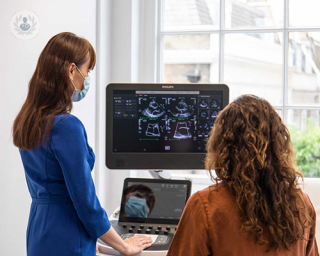

Transoesophageal echocardiography (TOE): a comprehensive guide
By Dr Gosia Wamil
2025-01-28
Transoesophageal echocardiography (TOE) is a specialised, sophisticated ultrasound that provides an exceptionally detailed look at your heart and its adjacent structures. Imagine a high-tech camera that can see through the usual barriers, giving your doctor an insider's view of your heart's inner workings. That's what TOE offers, making it a game-changer in heart care. Leading consultant cardiologist Dr Gosia Wamil answers your questions about transoesophageal echocardiography (TOE) including when it may be necessary, what it involves and the recovery process. See more
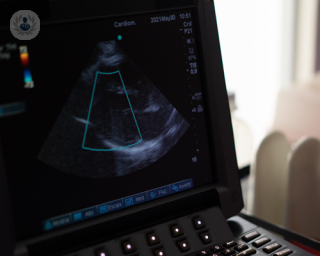

Transoesophageal echocardiogram: Keeping your heart on its TOE(s)
By Dr Francesco Lo Monaco
2025-01-28
A transoesophageal echocardiogram (TOE) detects diseases of the heart muscle and valves, and uses a probe that’s inserted into your oesophagus in order to take images of them using ultrasonography. We speak to well-known and highly-regarded London cardiologist Dr Francesco Lo Monoco, who discusses in the TOE procedure in expert detail. Read on to find out more. See more
Experts in Transoesophageal echocardiogram
-
Dr Vinay Kumar Bhatia
CardiologyExpert in:
- Echocardiogram
- Stress test
- Transoesophageal echocardiogram
- Heart failure
- Coronary heart disease
- Arrhythmia
-
Professor Constantinos (Dinos) Missouris
CardiologyExpert in:
- Coronary heart disease
- Heart failure
- Arrhythmia
- Hypertension (high blood pressure)
- Ambulatory blood pressure monitoring
- Transoesophageal echocardiogram
-
Dr Jakub Lagan
CardiologyExpert in:
- Stress test
- Cardiac MRI
- Echocardiogram
- Transoesophageal echocardiogram
- Electrocardiogram
- Coronary CT
-
Dr Laura Corsinovi
CardiologyExpert in:
- Coronary CT
- Cardiac MRI
- Transoesophageal echocardiogram
- Valvular heart disease
- Cardiomyopathy
- Heart failure
-
Professor Sagar Doshi
CardiologyExpert in:
- TAVI (transcatheter aortic valve implantation)
- Mitral regurgitation
- Heart valve surgery
- Echocardiogram
- Transoesophageal echocardiogram
- Ambulatory blood pressure monitoring
- See all

Cleveland Clinic Portland Place Outpatient Centre
Cleveland Clinic Portland Place Outpatient Centre
24 Portland Place, W1B 1LU
No existe teléfono en el centro.
By using the telephone number provided by TOP DOCTORS, you automatically agree to let us use your phone number for statistical and commercial purposes. For further information, read our Privacy Policy
Top Doctors

Cleveland Clinic Moorgate Outpatient Centre
Cleveland Clinic Moorgate Outpatient Centre
55 Moorgate, EC2R 6BH
No existe teléfono en el centro.
By using the telephone number provided by TOP DOCTORS, you automatically agree to let us use your phone number for statistical and commercial purposes. For further information, read our Privacy Policy
Top Doctors

The Princess Margaret Hospital - part of Circle Health Group
The Princess Margaret Hospital - part of Circle Health Group
Osborne Rd, Windsor SL4 3SJ
No existe teléfono en el centro.
By using the telephone number provided by TOP DOCTORS, you automatically agree to let us use your phone number for statistical and commercial purposes. For further information, read our Privacy Policy
Top Doctors
-
Cleveland Clinic Portland Place Outpatient Centre
24 Portland Place, W1B 1LU, Central LondonExpert in:
- Diagnosis of Cancer
- Diagnostics
- Women’s health
- Sports Medicine
- General practice
- Health check up
-
Cleveland Clinic Moorgate Outpatient Centre
55 Moorgate, EC2R 6BH, Central LondonExpert in:
- Digestive
- Cardiology
- Dermatology
- Diagnostic Imaging
- Diagnostics
- Obstetrics and Gynaecology
-
The Princess Margaret Hospital - part of Circle Health Group
Osborne Rd, Windsor SL4 3SJ, WindsorExpert in:
- Brachytherapy
- Cardiology
- General Surgery
- Orthopaedic surgery
- Robotic Surgery
- Dermatology
- See all
- Most viewed diseases, medical tests, and treatments
- Electrophysiology study
- Genetic testing
- Anxiety
- Long Covid
- Medicolegal
- Robotic surgery
- Hypertension (high blood pressure)
- MRI
- Fatty liver
- Cholesterol

